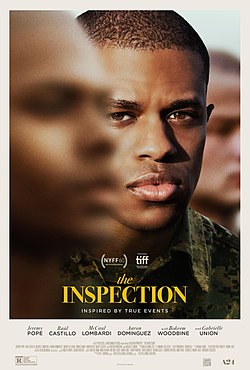
This movie could work easily as pure fiction, but it is based on the author’s real life experience in deciding to become a marine, given that his choices in life are bleak. In reality, Elegance Bratton has told people that he didn’t even realize he was homeless, though he lived, more or less, on the streets.
In the movie, he has a horrible mother who, because she is so disgusted by his homosexuality, puts newspaper on the couch so he doesn’t taint it with what I suppose she thinks are gay cooties. It is so weird to see homophobia in minority communities but it’s just as prevalent there as anywhere. This is why a term developed for gay black men called “the down low,” or “being on the down low.”
The surprising thing about this movie is the change that comes over the recruits as they go through boot camp. The year is 2005 and probably at the very start of what I would call the seismic change that led to gay marriage and its recent establishment in the law itself, due to the open threats by the Supreme Court and especially, Uncle Tom himself, Clarence Thomas, to overthrow the court opinion that made gay marriage legal in all 50 states. (The new law does not force states to marry gay people — it can’t do that — but it does require same sex marriages performed in other states to be recognized in every state.) So these recruits start out with their usual biases and hatreds on full display. On their first day they are all screamed at, “Are you a homosexual,” “Are you a communist,” etc. Ellis French, played by the amazing Jeremy Pope, does the usual denial, but, from what I could tell, he gets an erection in the shower and the others nearly beat him to death for getting it. At that point, they know he’s gay, but this being the era of “Don’t ask don’t tell,” they simply force him to sleep away from the others. But, maybe because of his kindness, and his strength, his ability to fight back, his death by drowning (he is revived and does not report the incident, which would have landed his Sargent some jail time,) his ability to comfort other recruits, and perhaps his humor, (although there’s not much of it), they become Marines whose motto is that they “fight to protect the Marine to my right and the Marine to my left.”
The real drama of the movie is actually at the end, when his homophobic mother decides to come to his graduation, and I won’t spoil it any further, suffice to say, he is a Marine among fellow Marines, and a changed man with a future. It speaks loads about the lack of opportunities for young black men, and especially young gay black men, most of whom, as he points out early in the film, are either dead or in jail.
I don’t think the reviews were more than “generally good,” but I thought for a man who has come that far — from not even knowing he was homeless to getting funding and writing and directing a movie based on his life — it was far more than generally good. It was deeply moving and that should be the judge of all artworks.
